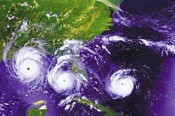
Hurricane season is officially under way, and if you live anywhere near the coast, that means it’s time to stock up on bottled water, batteries and non-perishable food. But those aren’t the only things you need to do before a hurricane approaches. The beginning of the season is a good time to review your hurricane plan and make sure all the pieces are in order.
Plus, your life is much easier if you make many of your preparations well before a storm approaches. Here are 10 things you need to do before a hurricane:
1. Know what risks your neighborhood faces. Are you in an evacuation zone? Will the streets flood? Will the neighborhood entrances and exits be blocked? Seek out this information at the beginning of hurricane season. Check the evacuation maps created by your city or county. If you’re new to the neighborhood, ask your neighbors what happened during the last big storm.
2. If you are in an evacuation zone, make a plan. Decide whether you’ll stay with a friend farther inland or drive to a hotel in another county. If someone in your family is elderly, handicapped or pregnant, a plan is even more important. Don’t forget to make a plan for your pets. Some cities have pet-friendly shelters, or you may be able to board your pets, but you’ll need to have proof of vaccinations ready.
3. Buy non-perishable food that you will eat. Don’t stock up on canned food you won’t eat if there isn’t a storm, but do have enough to feed your family for at least 72 hours. If you have a grill, make sure you have charcoal or gas so you can cook the food from your refrigerator. Fill plastic jugs with water and have an emergency supply of bottled water to drink after those jugs are gone. You need about a gallon per person per day. Remember pet food, and consider them when creating your water supply. A tip: Hurricane season is not the best time to stock your freezer.
4. Have a portable radio, powerful flashlights or lanterns and plenty of the right size batteries. A portable radio will help you follow the storm’s path and get advice from emergency personnel once the power goes out. You won’t believe how dark it can be with no city lights. A battery-powered fan can help keep you cooler. If you have a generator, fire it up to make sure it works and get a supply of gasoline if needed. You can also buy a battery-powered digital TV with antenna for less than $100. Portable TVs from before 2006 will no longer work.
5. Charge your cellphone, tablet, laptop computer and any other electronic devices. Then think about how you will make the charge last longer and recharge if the power stays out. Learn how to turn off apps so you can conserve your cellphone or tablet power. When a storm is bearing down on us, it’s too late to look at tutorials. A car charger and a solar charger or back-up battery for your cellphone are inexpensive and useful even when there isn’t a storm. While you can get more sophisticated equipment designed for camping that will charge your devices, you may not need it.
6. Get cash. If there is a widespread power failure, you won’t be able to go to the bank or ATM. Stores that can open without electricity may not take credit cards. You may also need cash to pay people to cut up fallen tree limbs or clear debris.
7. Fill your car with gas. Some gas stations have generators, but many do not. Plus, you may end up having to drive long distances to find open stores and restaurants.
8. Refill prescriptions. If the power goes out, doctor’s offices and pharmacies may be closed. Make sure you have basic over-the-counter drugs, too, including antihistamine, aspirin or antiseptic cream. If you have a baby, don’t forget diapers and formula.
9. Round up your old-school tools: manual can opener, matches, coffee filters and ground coffee if you have a gas stove or grill, paper plates and cups, hammer, screwdriver, pliers and duct tape. If you camp, dig those cans of Sterno and your camp stove out of the garage. If you have a land line, make sure you have at least one phone that works without electricity.
10. Gather important documents and back up computer data. If your home is damaged, you may not be able to retrieve your insurance policy from a sodden file box. Prepare a file of important document you’ll take with you if you evacuate. Set up backups of your computer data (cloud storage is ideal) well ahead of a storm, so you can back up quickly if needed. You may want to put copies of important documents on a flash drive or in the cloud for easy retrieval.
I really appreciate it, I will visit whenever I have found the stuff That I have been searching for in all the web for, keep up the great work! Thanks for sharing. . .
ReplyDeleteprofessional movers and packers varanasi.